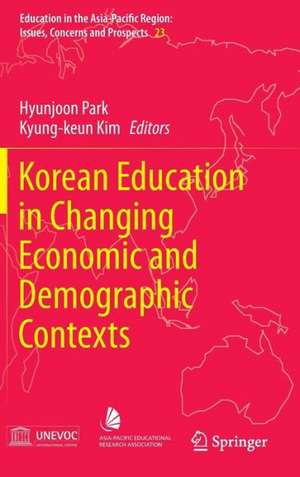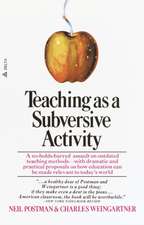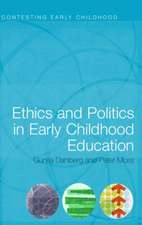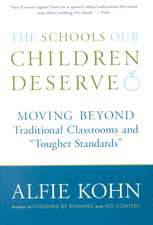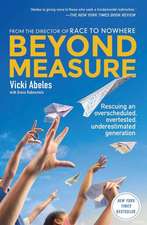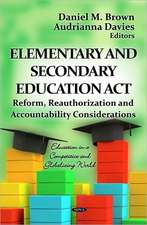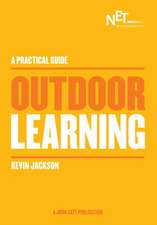Korean Education in Changing Economic and Demographic Contexts: Education in the Asia-Pacific Region: Issues, Concerns and Prospects, cartea 23
Editat de Hyunjoon Park, Kyung-keun Kimen Limba Engleză Hardback – 9 dec 2013
Next, the book introduces growing concerns over whether the traditional model of Korean education can adequately meet the demands of the emerging knowledge-based economy. It examines features of new reform measures that have been introduced to help Korean education prepare students for the new economy.
The third part discusses how an influx of diverse migrant groups, including marriage migrants, migrant workers, and North Korean migrants, and the rising divorce rate — two major demographic changes— challenge the fundamental assumption of cultural homogeneity that has long been a part of Korean education.
This detailed analysis of a society and educational system in transition will appeal to a wide range of readers, from those involved with Korean education to educators and administrators in countries currently looking for ways to handle their own economic and demographic changes.
| Toate formatele și edițiile | Preț | Express |
|---|---|---|
| Paperback (1) | 554.41 lei 38-44 zile | |
| Springer Nature Singapore – 18 sep 2016 | 554.41 lei 38-44 zile | |
| Hardback (1) | 565.08 lei 38-44 zile | |
| Springer Nature Singapore – 9 dec 2013 | 565.08 lei 38-44 zile |
Din seria Education in the Asia-Pacific Region: Issues, Concerns and Prospects
- 15%
 Preț: 646.62 lei
Preț: 646.62 lei -
 Preț: 386.99 lei
Preț: 386.99 lei - 18%
 Preț: 730.02 lei
Preț: 730.02 lei -
 Preț: 390.84 lei
Preț: 390.84 lei - 15%
 Preț: 587.53 lei
Preț: 587.53 lei -
 Preț: 389.88 lei
Preț: 389.88 lei - 15%
 Preț: 638.43 lei
Preț: 638.43 lei - 15%
 Preț: 635.80 lei
Preț: 635.80 lei - 15%
 Preț: 644.30 lei
Preț: 644.30 lei - 18%
 Preț: 1117.99 lei
Preț: 1117.99 lei - 15%
 Preț: 638.11 lei
Preț: 638.11 lei - 15%
 Preț: 648.89 lei
Preț: 648.89 lei - 24%
 Preț: 729.89 lei
Preț: 729.89 lei - 20%
 Preț: 551.86 lei
Preț: 551.86 lei - 24%
 Preț: 676.79 lei
Preț: 676.79 lei - 20%
 Preț: 553.79 lei
Preț: 553.79 lei - 24%
 Preț: 797.37 lei
Preț: 797.37 lei - 20%
 Preț: 551.57 lei
Preț: 551.57 lei - 15%
 Preț: 644.30 lei
Preț: 644.30 lei - 20%
 Preț: 557.75 lei
Preț: 557.75 lei - 20%
 Preț: 558.62 lei
Preț: 558.62 lei - 20%
 Preț: 552.44 lei
Preț: 552.44 lei -
 Preț: 370.19 lei
Preț: 370.19 lei - 20%
 Preț: 566.19 lei
Preț: 566.19 lei -
 Preț: 382.82 lei
Preț: 382.82 lei -
 Preț: 383.21 lei
Preț: 383.21 lei -
 Preț: 374.76 lei
Preț: 374.76 lei - 20%
 Preț: 566.75 lei
Preț: 566.75 lei - 15%
 Preț: 644.49 lei
Preț: 644.49 lei
Preț: 565.08 lei
Preț vechi: 706.35 lei
-20% Nou
Puncte Express: 848
Preț estimativ în valută:
108.13€ • 113.20$ • 89.47£
108.13€ • 113.20$ • 89.47£
Carte tipărită la comandă
Livrare economică 02-08 aprilie
Preluare comenzi: 021 569.72.76
Specificații
ISBN-13: 9789814451260
ISBN-10: 9814451266
Pagini: 224
Ilustrații: XII, 209 p. 14 illus.
Dimensiuni: 155 x 235 x 18 mm
Greutate: 0.49 kg
Ediția:2014
Editura: Springer Nature Singapore
Colecția Springer
Seria Education in the Asia-Pacific Region: Issues, Concerns and Prospects
Locul publicării:Singapore, Singapore
ISBN-10: 9814451266
Pagini: 224
Ilustrații: XII, 209 p. 14 illus.
Dimensiuni: 155 x 235 x 18 mm
Greutate: 0.49 kg
Ediția:2014
Editura: Springer Nature Singapore
Colecția Springer
Seria Education in the Asia-Pacific Region: Issues, Concerns and Prospects
Locul publicării:Singapore, Singapore
Public țintă
ResearchCuprins
Preface.- Part 1: Current Contours of Korean Education.- 1. Determinants of Academic Achievement in Republic of Korea; Kyungkeun Kim and Soo-yong Byun.-2. Shadow Education and Academic Success in Republic of Korea; Soo-yong Byun.- 3. The Analysis of Entering the Labor Market among Women Doctorates in Republic of Korea; Jae-Hee Ahn.- 4. Educational Expansion and Labor Market Entry of New Graduates in Korea and Japan; Shin Arita.- Part 2: Educational Reforms in a Changing Economy.- 5. Evaluations of Educational Reform Measures and Future Directions for the Knowledge-Based Society: Focusing on Higher Education; Hyunsook Yu.- 6. Youth Key Competences in Korea; Kihun Kim.- 7. Effects of Ability Grouping on Middle School Students’ Affective Outcomes; Yeo-jung Hwang.- Part 3: Demographic Changes and Educational Challenges.- 8. Single Parenthood and Children’s Education in Republic of Korea; Hyunjoon Park.- 9. Multicultural Education in Republic of Korea: Social Change and School Education; Min-Kyung Lee.- 10. Educational Challenges of and Support for Young North Korean Immigrants; Yoon Young Kim.- Conclusion: Korean Education in Transition by Editors.
Textul de pe ultima copertă
This edited volume offers a comprehensive survey of Korean education in transition. Divided into three parts, the book first assesses the current state of Korean education. It examines how the educational system handles the effects of family background and gender in helping students smoothly transition from school to the labor market.
Next, the book introduces growing concerns over whether the traditional model of Korean education can adequately meet the demands of the emerging knowledge-based economy. It examines features of new reform measures that have been introduced to help Korean education prepare students for the new economy.
The third part discusses how an influx of diverse migrant groups, including marriage migrants, migrant workers, and North Korean migrants, and the rising divorce rate — two major demographic changes — challenge the fundamental assumption of cultural homogeneity that has long been a part of Korean education.
This detailed analysis of a society and educational system in transition will appeal to a wide range of readers, from those involved with Korean education to educators and administrators in countries currently looking for ways to handle their own economic and demographic changes.
Next, the book introduces growing concerns over whether the traditional model of Korean education can adequately meet the demands of the emerging knowledge-based economy. It examines features of new reform measures that have been introduced to help Korean education prepare students for the new economy.
The third part discusses how an influx of diverse migrant groups, including marriage migrants, migrant workers, and North Korean migrants, and the rising divorce rate — two major demographic changes — challenge the fundamental assumption of cultural homogeneity that has long been a part of Korean education.
This detailed analysis of a society and educational system in transition will appeal to a wide range of readers, from those involved with Korean education to educators and administrators in countries currently looking for ways to handle their own economic and demographic changes.
Caracteristici
Features 10 papers that examine recent changes in the economic and demographic environments of Korea and their effects on Korean education Examines ways an educational system has sought to handle the challenges posed by rising immigration and the emerging knowledge-based economy Places educational issues in an Asian society in a broad context of societal changes and their consequences — will be of interest to researchers and the general public outside of Korea in an attempt to understand their own educational systems in comparative perspective
